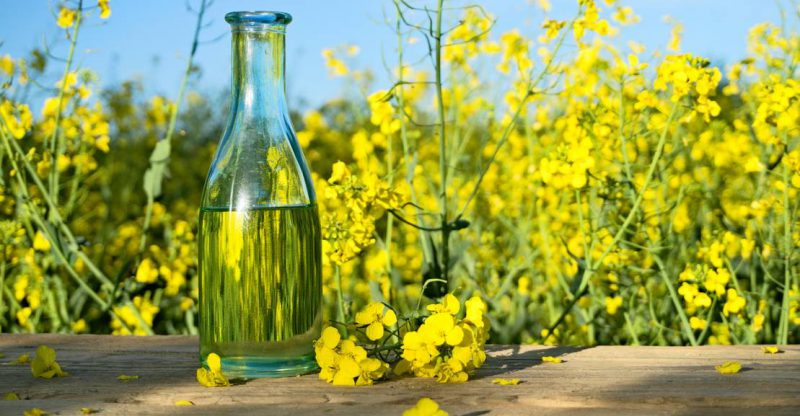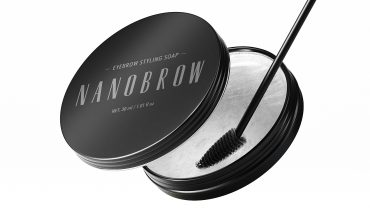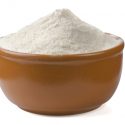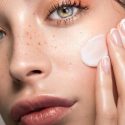Rapeseed oil – cosmetic properties
Rape oil is the third most popular vegetable oil in the world. It’s the Japanese and Canadians who reach for it most often, and the Americans and Mexicans are its second group of most eager users. However, rapeseed oil has been used not only for culinary purposes but also in care, because it works well in the protection and regeneration of the hair and scalp. It can be used on its own or combined with other oils and products available in every kitchen. What cosmetic properties does rapeseed oil have and how it affects the hair and scalp? Which rapeseed oil is best to choose?
Rapeseed oil – properties
As the name indicates, rapeseed oil is pressed from rape seeds, which contain up to 45% of fatty acids. Since the original varieties of this plant contained significant amounts of harmful euryl acid, only its selected variety is currently used. In many countries, rapeseed oil has found a wide application in the kitchen, where it served mainly for frying and baking. Unfortunately, for this purpose, purified products are used, which, although characterized by a high temperature of smoking, do not have greater healthful properties. For this reason, a much better choice is the cold pressed rapeseed oil, except that it must not be subjected to heat treatment during cooking.
Rapeseed oil – composition and cosmetic properties
The wide use of rapeseed oil results from its rich and healthy composition. The unsaturated fatty acids contained in it, provide valuable moisturizing properties that improve the condition of the scalp. In turn, due to the light texture, rapeseed oil easily penetrates the hair structure, and as a result, smoothes it and restores its healthy appearance.
Rapeseed oil has a regenerative and protective effect on the hair, which is why it works, among others, in the fight against splitting ends. It owes its amazing properties to the content of plant sterols, vitamin E and protein. Plant sterols accelerate the regeneration of damaged cells; vitamin E prevents further damage, and the protein is helpful to anyone who tries to keep their hair in good condition.
In addition, rapeseed oil contains a low concentration of saturated fat and high concentration of monounsaturated fatty acids, which makes it an effective agent for daily hair care. Its popularity is increased thanks to the low price and wide availability.
Rapeseed oil – influence on the hair and scalp
Rapeseed oil has moisturizing properties, which is why it will work well in the care of dry skin. Because the smell of rapeseed oil does not suit everyone, it can be mixed with lavender oil, rose oil or sandalwood oil. The oil mixture should be stored in a sealed bottle and used after bathing or showering.
Unrefined extra-virgin rapeseed oil improves the condition of the scalp and accelerates hair growth. Just a few drops of it are enough to effectively moisturize the scalp. Rapeseed oil combined with other ingredients can form a moisturizing and regenerative mask. The mask prevents hair loss, excessive dryness and split ends and restores the hair’s natural glow.
Which rapeseed oil is best to choose?
When choosing rapeseed oil, look for a high-quality product that will provide the highest nutritional value. For this reason, before buying it is worth reading the label and opt for organic, cold-pressed rapeseed oil. These types of natural products are more and more often available not only in healthy food and online stores but also in well-stocked grocery shops.
Rapeseed oil – summary
In hair care, rapeseed oil is more and more willingly used. Usually, such a treatment gives the expected results, but not always. This is because natural products can weigh the hair down and reduce its susceptibility to styling treatments.
Rapeseed oil moisturizes the hair and prevents its uncontrolled curling, and at the same time, it is easily available and relatively cheap. You can mix it with warm water and pour it into a spray bottle, which will facilitate its use.
Rapeseed oil has many properties that not only improve the appearance and condition of the hair, but can also positively affect our health. High-quality virgin oil produced from organic seed can be used regularly and for a long period of time without having to worry about side effects. However, internally, it should be used in moderate doses, because its excess may cause unwanted side effects.
In addition, rapeseed oil solves the problem of joint stiffness and inflammation and supports the treatment of asthma and intestinal disorders.






Leave a Reply